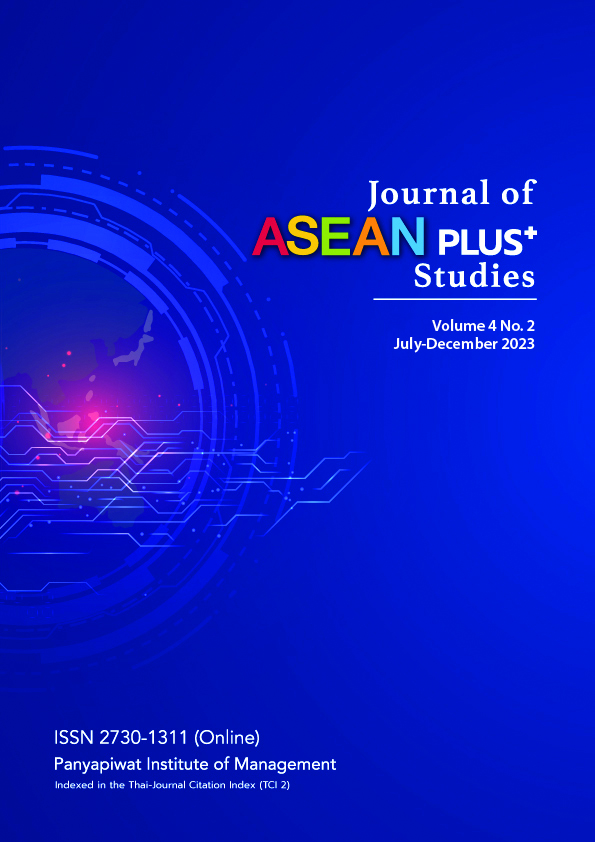The Key Factors for Local Development towards Sustainable Smart City and Quality of Life Enhancement
Keywords:
Local Development, Sustainable Smart City, Quality of LifeAbstract
The purpose of this research was 1) to examine the factors that influences local development for a sustainable quality of life in a sustainable smart city, 2) to investigate the effects of these factors and 3) to provide guidelines for enhancing local development. The research employed a combination of quantitative and qualitative approaches. Data was gathered from a sample group comprising local government officials who were involved in smart city development. The sampling methods utilized probability sampling with the total of 395 participants. The study involved in-depth interviews with key informants totaling 10 individuals. Data analysis was conducted using mean, standard deviation, Pearson's correlation coefficient, multiple regression analysis, and content analysis. The findings of the research were 1) Overall, the level of local development aimed at achieving a sustainable quality of life in a sustainable smart city was high. Smart government management was ranked as the most influential factor. 2) The local leadership had the most significant impact on the development of the region for a highly. Moreover, it demonstrated a positive correlation in the same direction, ranging from 0.727 to 0.851. The foundational structural factors of a smart city exhibited the highest level of interrelation, and 3) Guidelines for the development of a smart city should focus on establishing an environmental system to foster the development of digital infrastructure and the implementation of smart city solutions in all areas. Collaboration between the public and private sectors in utilizing technology and innovation to enhance the quality of life.
References
Chaiprasert, N. (2022). Roles of locality in smart city management. Journal of Palisueksabuddhaghosa Review, 8(1), 71-84.
Chittmittrapap, P., Kerdwichai, R., Suksod, P., & Chantararatmanee, D. (2022). The driving factors to the success of smart city development in Phuket province. Panyapiwat Journal,14(1), 188-202.
Chourabi, H., Nam, T., Walker, S., Gil-Garcia, J. R., Mellouli, S., Nahon, K., Pardo, T. A., & Scholl, H. J. (2012). Understanding smart cities: An integrative framework. The 45th Hawaii International Conference on System Sciences. Hawaii, USA.
Cronbach, L. J. (1970). Essentials of psychological testing (3rd ed). Harper & Row Publisher.
Dameri, R. P. (2017). The conceptual idea of smart city: University, industry, and government vision. In R. P. Dameri (Ed.), Smart City Implementation. Springer, Cham.
Department of Local Administration. (2020, January 10). Summarizing data from Local Government Organizations Nationwide. https://www.dla.go.th/work/abt/index.jsp.
Digital Economy Promotion Agency. (2022, January 10). City data platform. https://www.
citydata.in.th/en/smart-city-thailand/
European Parliamentary. (2014). Mapping smart cities in the EU. Brussels: European Union. https://www.europarl.europa.eu//RegData
/etudes/etudes/join/2014/507480/IPOL-ITRE_ET(2014)507480_EN.pdf
Gifnger, R., Fertner, C., Kramar, H., Kalasek, R., Pichler-Milanović, N., & Meijers, E. (2007). Smart cities ranking of european medium-sized cities. Vienna University of Technology Centre of Reginal Science, Vienna UT.
Glasmeier, A., & Christopherson, S. (2015). Thinking about smart cities. Cambridge Journal of Regions, Economy and Society, 8(1), 3-12.
Gliem, J. A., & Gliem, R. R. (2003). Calculating, interpreting, and reporting cronbach’s alpha reliability coefcient for likert-type scales. In Proceeding of the Midwest Research to Practice Conference in Adult, Continuing, and Community Education (pp. 82-88).
Columbus, OH.
Iamtrakul, P., Klaylee, J., & Ruengratanaumporn, I. (2021). Participatory planning approachtowards smart sustainable city development. Proceedings of International Structural Engineering and Construction, 8(1), 1-6.
IBM Global Business Services. (2009, January 7). A vision of smarter cities (Executive report). https://www.ibm.com/dowloand/cas/
JYLM4ZA
Jaitip, C., & Chienwattanasook, K. (2018). The capacity of business leaders in a global situation characterized by volatility, uncertainty, complexity and ambiguity. Burapha Journal of Business Management, 7(1), 1-14.
Jensantikul, N. (2020). Smart city: Meaning and considerations for city development. Integrated Social Science Journal, 7(1), 3-20.
Johansen, B. (2012). Leaders make the future: Ten new leadership skills for an uncertain world. San Francisco: Berrett-Koehler Publishers, Inc.
Jumnong, P., & Lowatcharin, G. (2022). The implementation of the smart city policy of phuket province. Political Science and Public Administration Journal, 13(2), 215-222.






